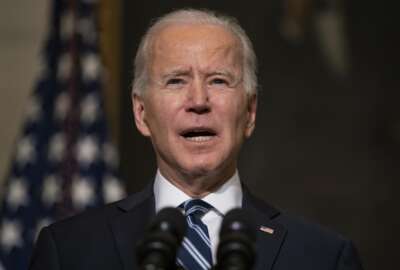
President Biden looking to attract more people from STEM fields into the national security workforce
In today's Federal Newscast, a new memo from President Biden will create a new inter-agency task force to develop proposals to recruit, retain and support national...
To listen to the Federal Newscast on your phone or mobile device, subscribe in PodcastOne or Apple Podcasts. The best listening experience on desktop can be found using Chrome, Firefox or Safari.
- President Joe Biden is planning a new memo aimed at modernizing the national security workforce. Biden’s memo will create a new inter-agency task force. The group will develop proposals to recruit, retain and support national security professionals. And it’ll focus on creating more pathways for people with science, technology, engineering, math and cyber skills to join public service. The White House says Biden will also issue another memo outlining the structure of the National Security Council.
- More major programs in the Defense Department are awarding fixed price contracts than ever before. A new report from the Government Accountability Office found the Pentagon used firm fixed price or firm fixed price with incentive contracts for more than $30 billion of the $63 billion awarded for major programs in fiscal 2019. GAO recommended that DoD should take a closer look at the incentive-based firm fixed price contracts. DoD has been promoting the use this lower-risk type of contract since the 2010 Better Buying Power memo.
- Military members seeking counseling will have it provided by contractor personnel. Services contractor Leidos has won a contract to provide non-medical counselors for the Military and Family Life Counseling program. The contract was awarded by the General Services Administration’s Federal Systems Integration and Management Center. The cost plus deal has a one year base, plus four one-year options. Leidos says it’s worth up to $2 billion. The company will provide counseling and related program management at 100 military locations in the Western U.S., Middle East and part of Asia.
- The cost of the U.S. military presence to secure the nation’s capital in the wake of Jan. 6 is expected to come in at about $500 million. Defense officials tell the Associated Press the price tag includes the costs of keeping at least some National Guard members in D.C. through mid-March. And because they were activated for more than 30 days, health benefits are part of the cost equation. 26,000 guardsmen from all 50 states were part of the initial deployment. Up to 7,000 of them are expected to stay in the capital region until March 14. (Federal News Network)
- House and Senate Republicans are perplexed by the Biden administration’s request for more funding at the Department of Veterans Affairs. Congress gave VA $19 billion through the Coronavirus Aid, Relief and Economic Security Act last March. It also gave VA the flexibility to move the funding around to different accounts. VA obligated about $9 billion dollars of CARES Act funding as of the end of January. The House and Senate VA Committee ranking members said they’re not sure why VA asked for an additional $17 billion through the President’s COVID-19 relief proposal.
- The Space Force has 13 new officers. The Air Force Research Laboratory transferred members of its space vehicles and directed energy directorates to the new branch. The group of scientists and engineers are among some of the first Space Force Guardians. About 2,400 airmen have already transferred over to the service. The Space Force is expected to have about 16,000 members once it is fully fleshed out.
- The House Armed Services Committee will now have a subcommittee focusing on cyber and innovation and one on intelligence and special operations. Committee Chairman Adam Smith (D-Wash.) says the new committees reflect the need for more staff and time to oversee and enact legislation in those areas. Rep. Jim Langevin (D-R.I.) will head the Subcommittee on Cyber, Innovative Technologies and Information Systems. Rep. Rubin Gallego (D-Ariz.) will be in charge of the Subcommittee on Intelligence and Special Operations.
- President Joe Biden has ordered a pause to the previous administration’s plans to remove thousands of U.S. military personnel from Germany. The president told an audience at the State Department yesterday he wants to give new Defense Secretary Lloyd Austin time to make his own assessment of the military’s global force posture. Former President Donald Trump ordered about 9,500 troops relocated from Germany to other host nations last year. (Federal News Network)
- President Biden said his “Diplomacy First” agenda for the State Department focuses on rebuilding workforce morale and promoting diversity within its diplomatic ranks. “I want the people who work in this building, and our embassies and consulates around the world, to know I value your expertise, and I respect you. And I will have your back,” Biden said. But the Biden administration is also coordinating work between agencies. The president is directing Defense Secretary Lloyd Austin to work with Secretary of State Antony Blinken to better align the U.S. military footprint with its foreign policy goals.
- Biden officially withdrew the nomination for Dennis Kirk to be the chairman of the Merit Systems Protection Board. He also withdrew the nominations for John Barger, Christopher Burnham and Frank Dunlevy to serve on the Federal Retirement Thrift Investment Board. Former President Donald Trump sent these nominations to the Senate in early January. But they were never confirmed. The MSPB has been without a quorum for over four years. Most of the current TSP board members are now serving their third president. (White House)
- Another CIO is leaving government. Rocky Campione, the Energy department’s chief information officer, announced he plans on leaving on April 2 after almost 20 months on the job. He became CIO in July 2019. Campione told staff in an email obtained by Federal News Network that he’s heading back to the private sector. During his tenure, Campione helped transform Energy’s technology infrastructure by standardizing on Microsoft Office 365 and using Amazon Web Services. He also consolidated 47 data centers in fiscal 2020. It’s unclear who will be acting CIO after Campione leaves. (Federal News Network)
- The National Oceanic and Atmospheric Administration is investing in unmanned systems to collect data in the field. NOAA signed an agreement with the University of Southern Mississippi to improve how agency’s uses unmanned systems for ocean exploration and forecasting. Congress gave NOAA nearly $14 million in appropriations this year to expand its use of unmanned systems.
Copyright © 2025 Federal News Network. All rights reserved. This website is not intended for users located within the European Economic Area.
Eric White
Eric White is news anchor and Federal Drive producer at Federal News Network.
Follow @FEDERALNEWSCAST




